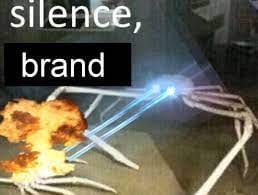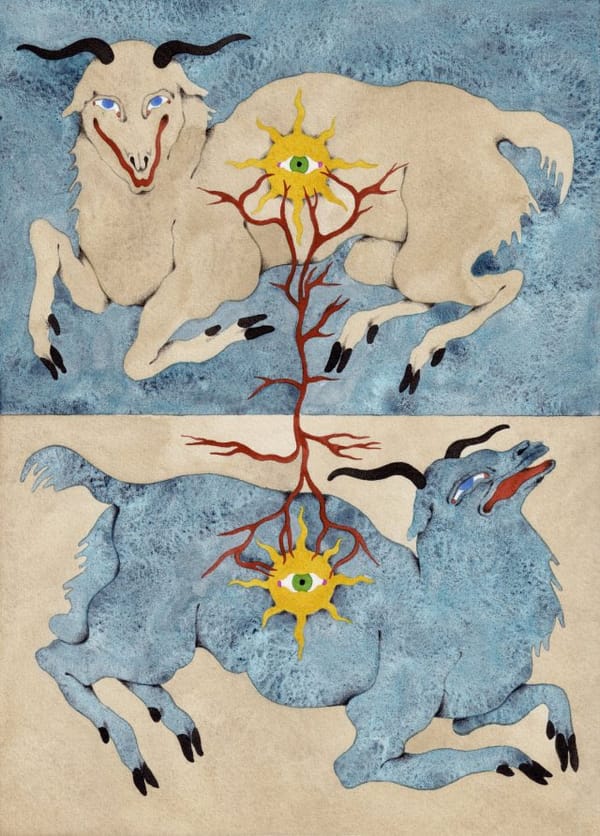Mindshare
Or why Kleenex is one of history's greatest colonizers

1.
Kleenex, not tissue. Uber, not taxi. Tweet, even after Elon changed the name. Our brains are timeshare properties. There’s the percentage of your time spent thinking about a given brand and then there are all the other ways. Teenage memories of In-n-Out; a draw to the smell of Subway bread created not by one specific memory, but the weight of accumulated ones. I see red when people say “we only use 10% of our brains” but there’s a grain of truth there. The mind is a double iceberg. What passes through it is a fraction of what could and what could is a fraction of what affects it yet is fundamentally inaccessible. Now that the physical world has been mined, drilled, and fracked, these icebergs are the new frontier.
2.
A group of masked men carrying swastika flags recently marched around my city. People on social media kept saying the dumbest thing possible. Stop giving them attention! That’s what they want! As if they have no other goals; as if ignoring them will stop them from achieving those goals. This particular brain rot is similar to the way advertisers talk about mindshare: as if it’s all that matters. Exposure and eyeballs. “All press is good press.” They’re trying to make us think like them, be wrong like them, and they’re succeeding. Younger generations’ aesthetic tendencies toward the random and absurd are a natural aversive reaction to this ideology and to people trying to wrestle their way into young people’s mindshare. Gen Z is inundated with influencers hawking products, musicians being unmasked as industry plants and nepo babies, and shock-and-awe marketing blitzkriegs like Barbenheimer that disappear as quickly as they start. They turn to the most inconsequential non-sequitur content they can find, free of any ulterior motive (or any motive at all), free of any conceptual hooks for marketers to grab onto. A hamster navigates a maze for 17 minutes; a man sings a song about how sitting is the opposite of standing; whatever skibidi toilet is. But as long as these things, in the end, still revolve around watching things on hegemonic online platforms like YouTube and TikTok, they remain an ineffective way of refuting “mindshare” logic.
3.
The success of white imperialism comes not from genetics but from a culture of unbridled repression and domination directed at self and other. Directed outward, this mostly leaves the natural world and other people bleeding at our feet. Directed inward, results are more mixed, less overtly damaging: clever inventions make people temporarily more comfortable, if more separate from nature, and make you and your friends rich, if surprisingly unhappy. What gets “invented” nowadays is just less physical and more mental, less changing how physical objects work and more changing how others’ minds work: what you think about and how, what you want and how, what you pay attention to and how. Patience, will, large-scale coordination: these become scarcer resources, unappealing to rediscover, not entirely by accident. We become unwilling and unable to hold attention on anything unpleasant for very long. If they had their way, modern colonizers would make 99% of people switch their thoughts between the same few most powerful brands and spend their time in the same few apps and stores. So they’re mostly there.
4.
There’s a South Park episode where the boys’ families go on a vacation to Aspen and repeatedly get trapped in timeshare presentations. They get off a ski lift at the top of the mountain, thinking they’re free, only to find themselves dumped back into a conference room. This is what has been done: our minds have become timeshares presented and sold to each other. Breaking the gatekeepers’ hold will feel counterintuitive because it involves a certain repression and discipline that may feel similar to the kind that underlies the system’s imperialistic hold on us in the first place. But there’s a difference between repressing emotions that come from our affinity to each other and our communities and repressing those that come from maladaptive patterns of corporate-friendly behavior, if we care to look. Looking is how we begin to trap them in timeshare presentations right back. Though we can’t “Eternal Sunshine” our memories of them away, they do continue to rely on us: our attention, our labor, our time. We can keep them reliant on us as we make our communities self-sufficient and sustainable. We can keep them in rooms in our minds until the very day we can leave them behind, stuck in a conference room of their own making, while we get out and hit the slopes.




